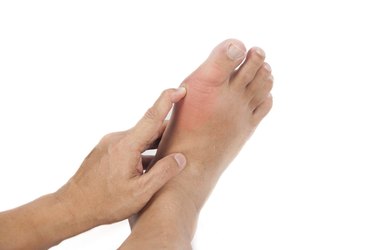
Gout, a type of arthritis, predominately affects men and very few women after the onset of menopause. Nearly 3.4 million men have gout in the United States. With a strong association found between diet and gout flare-ups, many people with gout turn to their diet to offer a solution for painful joint swelling.
The History of Gout
Video of the Day
Formerly known as the "rich man's disease" gout has most commonly been associated with affluence, in which people were able to afford rich, expensive foods in abundance. As research has progressed, we are now able to see that gout may manifest as a result of diet, stress, alcohol or drugs, starvation, or in the presence of other illnesses. Although we now know that gout may impact people from varying socioeconomic status, the dietary recommendations transverse all demographics with the common goal of preventing complications.
Video of the Day
What is Gout?
Gout is a metabolic disorder in which high uric acid levels result in arthritis-like symptoms. The breakdown of purine, a compound found in all cells – including foods – creates uric acid. Most commonly, swelling, pain, and redness of the large toe joint, ankles, and knees precipitate as uric acid levels increase in the joint or synovial fluid. Gout attacks may be acute, lasting three to 10 days, however, they may become more chronic, resulting in frequent attacks of pain and swelling.
Salt Intake
Although little research has been conducted on the direct impact sodium intake has on gout, several comorbidities sensitive to salt intake such as kidney disease, diabetes, hypertension, and kidney stones point to the importance of a low sodium diet. Research published in the January 2002 issue of "The New England Journal of Medicine" states that lowering salt intake significantly reduces the recurrence of kidney stones in people living with gout.
Dietary Recommendations
In addition to a low sodium diet, aim to consume a well-balanced diet high in low fat dairy products, fruits, vegetables, and low in seafood, beef, pork, and wild game meats. Consuming protein primarily from egg whites, nuts, peanut butter, and low fat cottage cheese are not connected with an increased incidence of gout. Abstaining from alcohol is also recommended to prevent gout flare-ups.
- PubMedHealth: Gout
- "The New England Journal of Medicine"'; Uric Acid and Diet — Insights into the Epidemic of Cardiovascular Disease; Richard J. Johnson, M.D., et al.; March 2004
- National Institute of Arthritis and Musculoskeletal and Skin Diseases: What is Gout?
- "The New England Journal of Medicine"; Comparison of Two Diets for the Prevention of Recurrent Stones in Idiopathic Hypercalciuria; Loris Borghi, M.D., et al.; January 2002
- "The New England Journal of Medicine"; Purine-Rich Foods, Dairy and Protein Intake, and the Risk of Gout in Men; Hyon K. Choi, M.D., et al.; March 2004